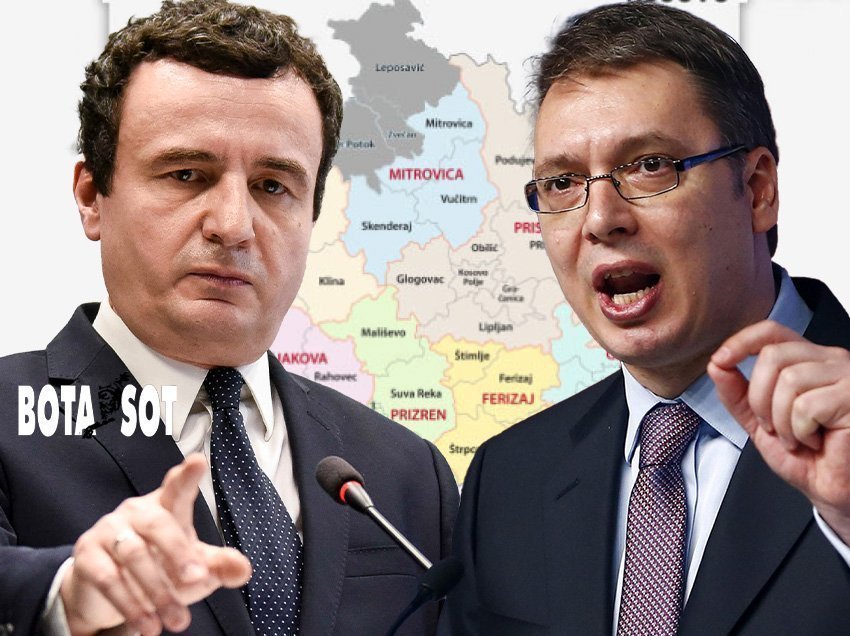In September, it will be one year since the last meeting between Kosovo’s Prime Minister, Albin Kurti, and Serbia’s President, Aleksandar Vučić.
A new Kurti-Vučić meeting does not seem likely anytime soon, according to the European Union’s spokesperson, Peter Stano.
Stano, reiterating the EU’s position against reopening the Ibër Bridge, also spoke about the ongoing dialogue. He mentioned that there is currently no scheduled date for the next round of talks between Kosovo and Serbia.
“The EU’s position is very clear. I don’t have a date for a meeting that I can announce right now, but the stance of the EU and all its partners is very clear when it comes to how the reopening of the bridge should be addressed. This is being discussed with Pristina and international partners,” Stano added.
Recent developments regarding the Ibër Bridge and the discussions about whether to open or keep it closed have reignited debates about the dialogue with Serbia.
The government of Kosovo insists on reopening the bridge, stating that it is not against anyone and aims solely for unity. Meanwhile, international representatives insist that this matter should be discussed in dialogue with Serbia.
Analysts argue that, at this stage, Kosovo does not need a Kurti-Vučić meeting, as it would imply discussing the opening or not of the bridge.
Cooperation with International Partners?

Political analyst Visar Xani suggests that even if a meeting occurs, it will be merely symbolic.
“There can be no new round of serious negotiations before the elections in Kosovo. Even if a meeting does take place, it will only be for appearances, without concrete or implementable results that have a direct impact on the dialogue process,” Xani states.
According to him, Serbia is using Kosovo’s legitimate actions, which do not have international support, to its advantage.
“Serbia is continuously exploiting the dialogue, portraying itself as a victim in order to present Kosovo as an aggressor to the international community. Thus, politically, Serbia is leveraging Kosovo’s actions—legitimate as they may be—to its own benefit, since they lack international backing. It is, therefore, up to Kosovo to work closely with international partners to justify their actions in northern Kosovo,” Xani adds.
In June this year, Kosovo’s Prime Minister, Albin Kurti, met in Brussels with the EU’s High Representative for Foreign Affairs, Josep Borrell, and the mediator, Miroslav Lajčák, but not with Serbia’s President, Aleksandar Vučić.
Kurti has set three conditions for further engagement in the process of normalizing relations with Serbia.
The European Union’s High Representative for Foreign Affairs, Josep Borrell, confirmed that no tripartite meeting was held in Brussels today, emphasizing that Kosovo was not ready for such a meeting. He stated that during bilateral meetings, Kurti presented three conditions for further engagement in the process of normalizing relations with Serbia.
“First, the formalization of the Basic Agreement through a signature by the respective state leaders. Second, the withdrawal of the official letter submitted to the EU by former Serbian Prime Minister Ana Brnabić on December 13, 2023. And third, the handover of Milan Radoičić and his paramilitary terrorist group to the judicial authorities of Kosovo,” Borrell said during a press conference after the bilateral meetings.
No Meeting at This Stage
Meanwhile, political analyst Ali Hertica argues that at this stage, Kosovo should not have a meeting between Kurti and Vučić.

According to him, if the meeting were held, it would mean asking Serbia about the bridge.
“Serbia, amid the significant problems Vučić faces internally, including what amounts to a near-uprising in Serbia, is not focused on the dialogue. I think that, at this stage, Kosovo should not have a meeting with Vučić, particularly concerning the statements for and against the opening of the Ibër Bridge, as it would mean asking Serbia if a bridge should be opened in a city of Kosovo,” Hertica asserts.
Furthermore, he believes that the meetings in the dialogue should be very tough, as Serbia and Vučić know how to play the victim card.
“We need to tell these international actors: show us a country in the world that asks another country whether a part of its territory should be opened or closed. Kosovo must defend its territory according to the constitution and the Ahtisaari Package agreements. The meetings in the dialogue must be very strict because Serbia and Vučić know how to play the victim card, which the international community seems to indulge by not respecting the sovereignty and rule of law throughout Kosovo,” the analyst adds.
It is worth remembering that an agreement for the normalization of relations was reached on February 27, 2023, in Brussels, and its Implementation Annex was agreed upon on March 18, 2023, in Ohrid. However, these documents do not bear the signatures of Kurti and Serbia’s President Aleksandar Vučić, due to the latter’s refusal.
Source: Botasot
Published by: Naile Ejupi







